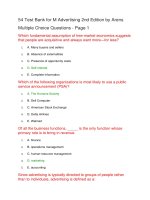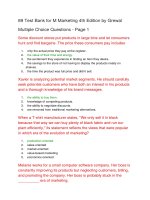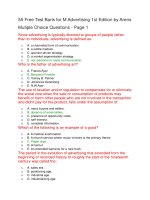Test bank for criminal justice 6th edition by adler
Bạn đang xem bản rút gọn của tài liệu. Xem và tải ngay bản đầy đủ của tài liệu tại đây (227.66 KB, 6 trang )
Page 1 of 6
This chapter has 64 questions.
Scroll down to see and select individual questions or
narrow the list using the checkboxes below.
0
questions at random and
keep in order
Multiple Choice Questions - (34)
Odd Numbered - (32)
True/False Questions - (10)
Even Numbered - (32)
Fill In The Blank Questions - (20)
1. According to your text, the sum total of society's activities to defend itself against the actions it defines as criminal is
called ______________.
criminology
police science
culture
→ criminal justice
Multiple Choice Question
2. The Wickersham Commission occurred in __________________.
→ 1929
1941
1966
1977
Multiple Choice Question
3. The emerging evidence-based movement in the social sciences calls for systematic reviews of criminal justice policies and
programs that look for solid empirical support for
what works
what doesn't work
what looks promising
none of these
→ all of these
Multiple Choice Question
4. In the case of __________ the Supreme Court mandated that every criminal defendant charged with a felony is entitled to
the assistance of counsel.
Brown v. Mississippi
U.S. v. Weeks
Goto v. Mayumi
Mapp v. Ohio
→ Gideon v. Wainwright
Multiple Choice Question
5. In the case of ____________ the Supreme Court ruled that arrestees have the right to be informed of their "right to remain
silent".
Brown v. Mississippi
U.S. v. Weeks
Goto v. Mayumi
Mapp v. Ohio
→ Miranda v. Arizona
Multiple Choice Question
6. In the 1960's the U.S. Supreme Court addressed many issues of rights for minorities and women under the leadership of
________________.
President Richard Nixon
→ Chief Justice Earl Warren
Chief Justice Warren Burger
Chief Justice William Rehnquist
Multiple Choice Question
7. The President's Commission on Law Enforcement and Administration of Justice was established by _________________.
President George W. Bush
President Bill Clinton
President Richard Nixon
→ President Lyndon Johnson
Multiple Choice Question
8. Who depicted the criminal justice process in the shape of a wedding cake?
→ Samuel Walker
Frank Schmalleger
Jennifer Rossi
Chief Justice William Rehnquist
Full file at />
Page 2 of 6
Multiple Choice Question
9. The author of The Limits of the Criminal Sanction was _____________.
Samuel Walker
President Bill Clinton
→ Herbert Packer
Freda Adler
Multiple Choice Question
10. In The Limits of the Criminal Sanction the author presents ___________.
a constitutional model of the Criminal Justice System
→ the due process model and the crime control model of the Criminal Justice System
the proper penalties for each of the major crimes
an argument for the legalization of drugs
Multiple Choice Question
11. Which of the following models requires strict adherence to the constitution?
→ the due process model
the constitutional model
the crime control model
all of the choices require strict adherence to the constitution
Multiple Choice Question
12. Which of the following models focuses on the efficiency and effectiveness of the criminal justice process?
the due process model
the constitutional model
→ the crime control model
all of the choices require strict adherence to the constitution
Multiple Choice Question
13. Which of the following models is known as an obstacle course?
→ the due process model
the constitutional model
the crime control model
all of the choices are known as an obstacle course
Multiple Choice Question
14. Which of the following models resembles an assembly line?
the due process model
the constitutional model
→ the crime control model
all of the choices resemble an assembly line
Multiple Choice Question
15. Which of the following are part of the eight goals for the ideal criminal justice system according to LaFave and Israel?
establishing an adversarial system of adjudication
establishing an accusatorial system of prosecution
minimizing erroneous convictions
minimizing the burdens of accusation and litigation
→ all of the choices are correct
Multiple Choice Question
16. Approximately, _______ of all crimes known to the police come from victim initiatives.
35%
55%
75%
→ 95%
Multiple Choice Question
17. The Supreme Court has ruled that the police have _____________ to take a suspect into custody when "the fact and
circumstances within their knowledge and of which they [have] reasonable trustworthy information [are] sufficient to
warrant a prudent man in believing that the [suspect] has committed or was committing an offence."
→ probable cause
reasonable suspicion
a preponderance of the evidence
proof beyond a reasonable doubt
Multiple Choice Question
18. The practice of finding inadmissible evidence that is illegally obtained is called the ______________.
Full file at />
Page 3 of 6
→
probable cause
exclusionary rule
the warrant requirement
justice rule
Multiple Choice Question
19. The exclusionary rule was created by ___________________.
the Federal Congress
the state legislatures
the President
→ the judiciary
Multiple Choice Question
20. If an officer has ______________ that a person might be engaged in the commission of a crime, the officer is authorized
to stop the person, ask questions, and frisk him or her to see if they are dangerous.
mens rea
actus reus
→ reasonable suspicion
habeaus corpus
Multiple Choice Question
21. The preview of a trial held in court before a judge, in which the prosecution must produce sufficient evidence for the case
to proceed to trial is called a ____________.
trial test
adjudicatory hearing
→ preliminary hearing
indictment
Multiple Choice Question
22. Ultimately, the decision to charge the defendant with a crime rests with the _______.
judge
defense attorney
victim
→ prosecutor
Multiple Choice Question
23. A panel of sixteen to twenty-three citizens who screen the prosecutor's evidence, in secret hearings, to decide whether
someone should be formally charged with a crime is called ______.
petit jury
→ grand jury
preliminary hearing
arraignment
Multiple Choice Question
24. A ________ case exists when there seems to be sufficient evidence to convict the defendant.
→ prima facie
actus reus
acquittal
grand jury
Multiple Choice Question
25. An accusation against a criminal defendant rendered by a grand jury on the basis of evidence is called ____________.
an information
→ an indictment
a conviction
an acquittal
Multiple Choice Question
26. An accusation against a criminal defendant prepared by a prosecuting attorney to be presented at a preliminary hearing is
called ___________.
→ an information
an indictment
a conviction
an acquittal
Multiple Choice Question
27. _____________ is an alternative to imprisonment, allowing a person found guilty of an offense to stay in the community,
under conditions and with supervision.
parole
Full file at />
Page 4 of 6
→
probation
conviction
a concurrent sentence
Multiple Choice Question
28. The supervised conditional release of a convicted prisoner before expiration of the sentence of imprisonment is called
_____________.
→ parole
probation
conviction
a pardon
Multiple Choice Question
29. The rate of people being diverted out of the criminal process is called __________.
acquittals
parole
sentencing guidelines
→ attrition rate
Multiple Choice Question
30. The term parens patriae means ________________.
in place of the parent
→ parent of the country
the offending parent
the caring parent
Multiple Choice Question
31. The term in loco parentis means ________________.
→ in place of the parent
parent of the county
the offending parent
the caring parent
Multiple Choice Question
32. The first American juvenile court was established in 1899 in _____________.
Philadelphia
Boston
→ Chicago
New York
Multiple Choice Question
33. Which case awarded juveniles constitutional rights that are similar to the ones that adults have.
Mapp v. Ohio
Gideon v. Wainwright
→ In re Gault
Chicago v. Morales
Multiple Choice Question
34. Criminal activities extending into, and violating the laws of several countries are called __________.
→ transnational crimes
border crimes
border crossing crimes
Interpol crimes
Multiple Choice Question
35. In the case of __________ the Supreme Court mandated that every criminal defendant charged with a felony is entitled to
the assistance of counsel.
Gideon v. Wainwright
Fill-in-the-Blank Question
36. ______________ of criminal acts have been called the "most influential" of all the decision makers of the entire criminal
justice system.
Victims
Fill-in-the-Blank Question
37. According to your text, the greatest of English legal scholars was ______________.
Sir William Blackstone
Fill-in-the-Blank Question
Full file at />
Page 5 of 6
38. According to your text, the sum total of society's activities to defend itself against the actions it defines as criminal is
called ______________.
criminal justice
Fill-in-the-Blank Question
39. In the case of ____________ the Supreme Court ruled that arrestees have the right to be informed of their "right to remain
silent."
Miranda v. Arizona
Fill-in-the-Blank Question
40. In the 1960's the U.S. Supreme Court addressed many issues of rights for minorities and women under the leadership of
________________.
Chief Justice Earl Warren
Fill-in-the-Blank Question
41. The President's Commission on Law Enforcement and Administration of Justice was established by President
_________________.
President Lyndon Johnson
Fill-in-the-Blank Question
42. The author of The Limits of the Criminal Sanction was _____________.
Herbert Packer
Fill-in-the-Blank Question
43. The model of criminal justice presented by Herbert Packer that requires a strict adherence to the constitution is called the
____________
due process mode
Fill-in-the-Blank Question
44. The model of criminal justice that focuses on the efficiency and effectiveness of the criminal justice process is called the
__________________.
crime control model
Fill-in-the-Blank Question
45. The model of criminal justice that is known as an obstacle course is called the ______.
due process model
Fill-in-the-Blank Question
46. The model of criminal justice that is known as an assembly line is called _______.
crime control model
Fill-in-the-Blank Question
47. The Supreme Court has ruled that the police have _____________ to take a suspect into custody when "the fact and
circumstances within their knowledge and of which they [have] reasonable trustworthy information [are] sufficient to
warrant a prudent man in believing that the [suspect] has committed or was committing an offence.
probable cause
Fill-in-the-Blank Question
48. The practice of finding inadmissible evidence that is illegally obtained is called the ______________.
exclusionary rule
Fill-in-the-Blank Question
49. If an officer has ______________ that a person might be engaged in the commission of a crime, the officer is authorized
to stop the person, ask questions, and frisk him or her to see if they are dangerous.
reasonable suspicion
Fill-in-the-Blank Question
50. The preview of a trial held in court before a judge, in which the prosecution must produce sufficient evidence for the case
to proceed to trial is called a ____________.
preliminary hearing
Fill-in-the-Blank Question
51. Ultimately, the decision to charge the defendant with a crime rest with the _______.
prosecutor
Fill-in-the-Blank Question
52. A panel of sixteen to twenty-three citizens who screen the prosecutor's evidence, in secret hearings, to decide whether
someone should be formally charged with a crime is called ______.
grand jury
Fill-in-the-Blank Question
53. A ________ case exists when there seems to be sufficient evidence to convict the defendant.
prima facie
Fill-in-the-Blank Question
Full file at />
Page 6 of 6
54. An accusation against a criminal defendant rendered by a grand jury on the basis of evidence is called ____________.
an indictment
Fill-in-the-Blank Question
55. Throughout this country's history, the shibboleth of "national security" has often been used as a pretext for massive
violations of individual rights.
→ True
False
True / False Question
56. The case of In re Gault awarded juveniles constitutional rights that are similar to the ones that adults have.
→ True
False
True / False Question
57. The first American juvenile court was in New York City in 1899.
True
→ False
True / False Question
58. The term in loco parentis means "the crazy parents".
True
→ False
True / False Question
59. The term parens patriae means the parent of the child.
True
→ False
True / False Question
60. The supervised conditional release of a convicted prisoner before expiration of the sentence of imprisonment is called
parole.
→ True
False
True / False Question
61. An accusation against a criminal defendant prepared by a prosecuting attorney to be presented at a preliminary hearing is
called an indictment ___________.
True
→ False
True / False Question
62. An accusation against a criminal defendant rendered by a grand jury on the basis of evidence is called an indictment.
→ True
False
True / False Question
63. A prima facie case exists when there seems to be sufficient evidence to convict the defendant.
→ True
False
True / False Question
64. A panel of sixteen to twenty-three citizens who screen the prosecutor's evidence, in secret hearings, to decide whether
someone should be formally charged with a crime is called a preliminary hearing.
True
→ False
True / False Question
Full file at />









